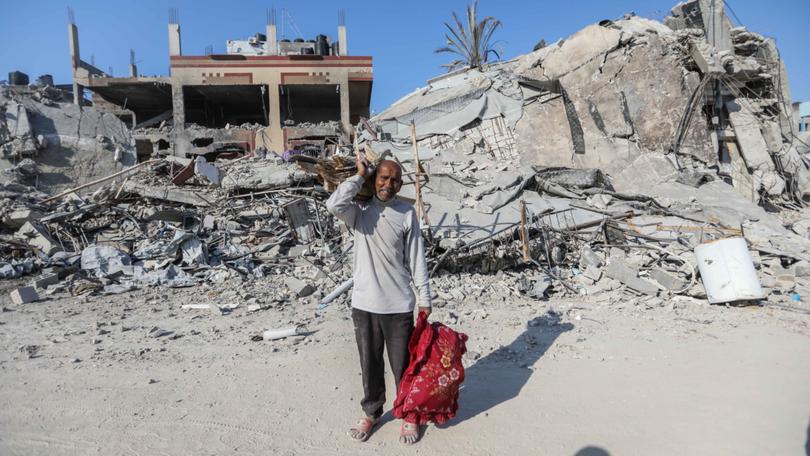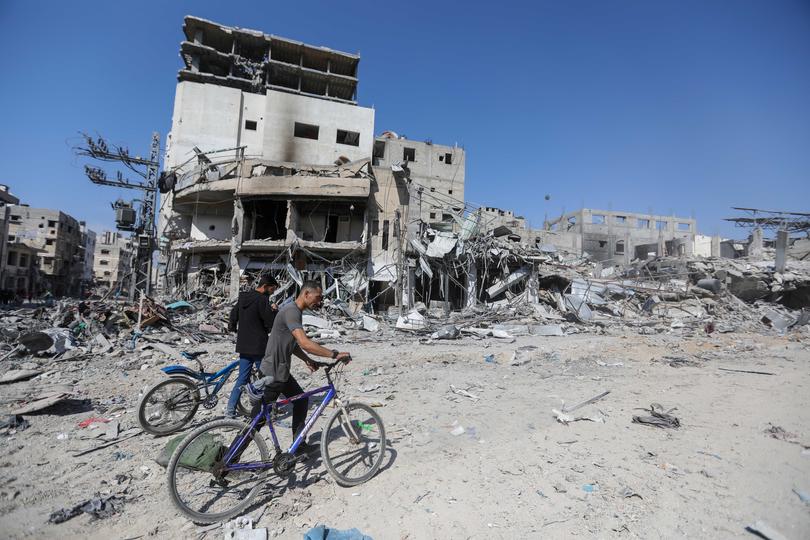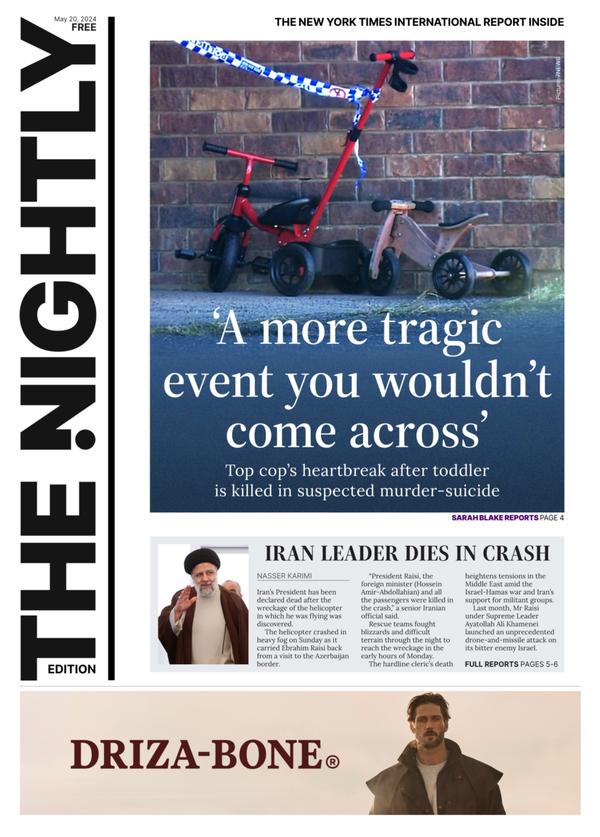Israeli army prepares for possible war with Hezbollah as IDF withdraws from Gaza’s south

The Israeli military says that it had completed another step in preparing for a possible war along its northern front, where it has been trading fire with the Lebanese militia Hezbollah for six months, even as it announced its withdrawal of more IDF soldiers from southern Gaza.
In a statement titled “Readiness for the Transition from Defense to Offense,” Israel’s military said the phase completed centred on logistics “for a broad mobilisation of IDF (Israel Defence Forces) troops”.
“The commanders of the regular and reserve units are prepared to summon and equip all the required soldiers in just a few hours and transport them to the front line for defensive and offensive missions,” the military said on Sunday.
Sign up to The Nightly's newsletters.
Get the first look at the digital newspaper, curated daily stories and breaking headlines delivered to your inbox.
By continuing you agree to our Terms and Privacy Policy.Hezbollah has been trading fire with Israel across Lebanon’s southern border since October 8, a day after the Palestinian group Hamas launched an attack on Israel that triggered Israel’s war in Gaza, and has sent shock waves throughout the Middle East.
Earlier, Israel’s military said it launched air strikes on eastern Lebanon and hit Hezbollah infrastructure sites after the Iranian-backed group downed an Israeli drone.
Hezbollah said it later fired dozens of Katyusha rockets that hit an air defence base in the occupied Golan Heights, in retaliation for the Israeli raids on eastern Lebanon.
The Israeli military did not immediately comment on that account.
Two security sources said the latest Israeli attack on Lebanon targeted a training camp belonging to Hezbollah in Janta village near the border with Syria and the town of Safri near Baalbek. There were no reported casualties, the sources said.
Israeli shelling has killed around 270 Hezbollah fighters and around 50 civilians, security sources say, and displaced some 90,000 people in southern Lebanon.
Around 60,000 Israelis have been uprooted from the country’s northern border area, and 18 people - civilians and soldiers - have been killed on the Israeli side of the border, according to Israeli tallies.
Hezbollah has said it would not halt fire before a ceasefire is implemented in Gaza, which ironically could be a step closer with Israel’s announcement that it had left just one brigade in the enclave’s south as it and Hamas prepared to send teams to Egypt for fresh talks on a potential truce in the six-month war.
Israel has been reducing numbers in Gaza since the start of the year to relieve reservists and is under growing pressure from its ally Washington to improve the humanitarian situation, especially after last week’s killing of seven aid workers.
The military spokesperson did not give details on reasons for withdrawing soldiers or numbers involved. But Defence Minister Yoav Gallant said the troops will be preparing for future operations in Gaza.
Both Israel and Hamas, the Islamist movement that controls Gaza, confirmed they were sending delegations to Egypt.
Hamas wants any deal to bring about an end to the war and withdrawal of Israeli forces. Israel has said that, after any truce, it would topple Hamas, which is sworn to its destruction.
Israeli Prime Minister Benjamin Netanyahu said there would be no deal without a hostage release and that he would not cave to international pressure. Hamas says an agreement must include freedom of movement of residents across the Gaza Strip.
More than 250 hostages were seized and some 1200 people killed during Hamas’ October 7 attack, according to Israeli tallies. More than 33,100 Palestinians have been killed in the Israeli offensive, according to the health ministry in Gaza.
Around 130 hostages are still being held in Gaza. Asked about troop withdrawals from the enclave, Israel’s Chief of the General Staff Herzi Halevi told reporters that the military was adapting its methods to what has been and will be a long war.
Gallant said Israel will press on with the war until Hamas no longer controls Gaza or threatens Israel as a military group.
“The forces are exiting and preparing for their next missions,” Gallant said at a meeting with military officials, according to a statement from his office, and “also their coming mission in the Rafah area”.
Israel says an incursion into the Rafah area, near the border with Egypt, is needed to eliminate Hamas but anxious foreign powers have said it could exact an unacceptable toll on civilians, with more than a million people sheltering there.
Israel says it will evacuate civilians before launching an incursion.
Palestinian residents of the southern Gaza city of Khan Younis, which has come under Israeli bombardment in recent months, said they had seen Israeli forces leaving the centre of the city and retreating to eastern districts.
Medics said they found at least 12 Palestinian bodies in the area. Some residents from Khan Younis, who have been sheltering in Rafah, began returning to their neighbourhoods after the Israeli troops left.
“It seems at the end it may be a happy Eid,” said Imad Joudat, 55, who lives with his eight-member family in a tent in Rafah, referring to the Muslim Eid al- Fitr holiday that starts mid-week.

“The occupation withdrew forces from Khan Younis, the Americans are pressuring after some foreigners were killed and Egypt is holding a big round with the Americans, the Israelis, Hamas and Qatar. This time we are hopeful,” Joudat told Reuters via a chat app.
Israel is under increased pressure from the United States, with President Joe Biden demanding that it improve humanitarian conditions in Gaza and work towards a ceasefire, and saying that US support could depend on that.
It was the first time Biden, a staunch supporter of Israel, has sought to leverage US backing to influence Israeli military behaviour. The US is a major supplier of arms to Israel.
Biden has also urged the leaders of Egypt and Qatar to pressure Hamas to agree to a ceasefire and hostage deal ahead of a fresh round of talks in Cairo.
Israel is also on alert for a possible retaliatory attack from Iran in reaction to the killing of Iranian generals on April 1.
